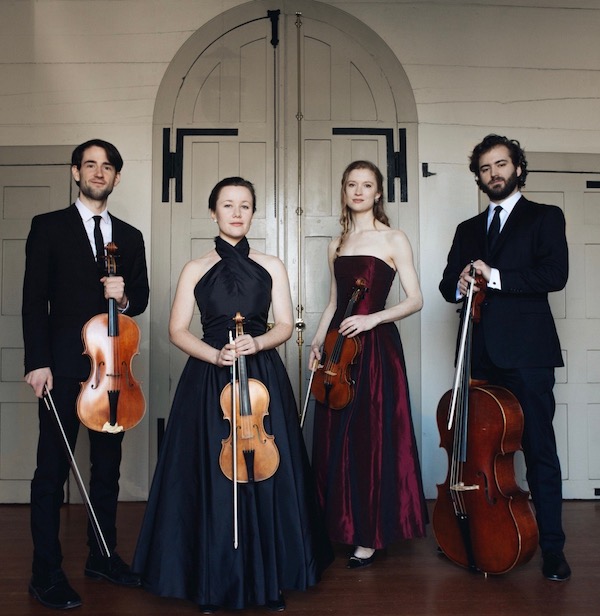Diderot Quartet, Bicket offer a lively program of Baroque rarities
One thing you can say for Harry Bicket: he’s not spending his weeks in Chicago staying in his hotel room doing email.
During his time off while in town conducting Handel’s Ariodante at Lyric Opera, the peripatetic English conductor/harpsichordist has been all over the place. In addition to conducting two performances with Music of the Baroque, he attended colleague Iestyn Davies’ Bach concert with Haymarket Opera last weekend.
The countertenor returned the favor Friday night, with Davies among the audience members for Bicket’s concert with the Diderot String Quartet at the Chicago Temple. The quintet also performed a shorter version of this program at the Cultural Center earlier in the week. Anyone who has seen Bicket performing in late-night piano bars, feel free to write in.
But it was the Diderot Quartet that was in the spotlight for this program of Baroque chamber music, with Bicket supplying discreet continuo support on organ and harpsichord, as needed.
Formed in 2012, the Diderot Quartet is one of the handful of string quartets performing exclusively on period instruments. Quartet-in-residence at Washington National Cathedral, the ensemble possesses an attractive corporate tone, with just enough grain to spice the individual instrumental timbres. Their playing was also impressive technically, almost entirely skirting the wayward pitch and tuning issues that inevitably bedevil historic instruments.
The program largely avoided the usual Baroque suspects, offering a diverting menu with some composers that would likely prove a discovery even for aficionados.
Very little music survives from Dario Castello and the Venetian composer’s Sonata Decima Sesto, written in 1629, was the earliest work on the program. Castello’s Sonata made a fine introduction, literally, with the four strings entering one by one in the gigue-like opening, alternating with held notes and bursts of fast, Vivaldi-like fiddling.
Biber’s Sonata No. 6 in A minor showed off the quartet’s ingratiating sound as they threw off the dozen brief sections, with violinists Adriane Post and Johanna Novom rapidly exchanging riffs.
Diderot cellist Paul Dwyer—who is also associate principal cello of the Lyric Opera Orchestra—was featured with Bicket in Domenico Gabrieli’s Sonata for Cello and Continuo in G major. All of the Diderot members’ instruments have a lovely tone quality but Dwyer’s unnamed cello is drop-dead gorgeous in its rich, burgundy-like sonority. With Bicket as organist the duo made Gabrieli’s sonata the highlight of the evening, Dwyer coaxing a mesmerizing sound in the aria-like cantilena lines as well as light and nimble articulation in the virtuosic sections.
At times one wanted a bit more of an assertive presence from the group’s violist Kyle Miller, as in Georg Muffat’s engaging Passacaglia: Grave in G major, though his playing was on the same level as his colleagues, if not always as audible.
Johann Philip Krieger’s Sonata a 4 proved an offbeat curio, opening with a stately Pachelbel-like theme and then immediately getting down and dirty with flashy bravura solos for each of the strings, all deftly assayed by the Diderot members. Francesco Durante’s Concerto No. 2 in G minor pushes the envelope even further, the arching Affettuoso melody quickly morphing into antic C.P.E. Bach territory, with the jagged solos and tonality-bending phrases negotiated well by all, especially the violinist Post.
The most familiar work on the program, Bach’s Orchestral Suite No. 2 in B minor, was heard in a downsized version. Several musicians and musicologists have pointed out that the familiar B-minor suite was likely based on a lost chamber work for string quartet and continuo in A minor. The Diderot Quartet performed four movements from Werner Breig’s 2003 reduction.
Moved a full step down, the Overture does sacrifice some majestic brilliance though the dynamic playing of the group made the ensuing Allegro section unusually exciting. The Rondeau was gracious and elegant, the Sarabande poised and thoughtful.
It’s difficult not to hear a hard-charging flute solo in one’s ear in the concluding Badinerie, but the Diderot’s vital playing still made it an exhilarating finale to an uncommonly thoughtful and impressively performed evening of Baroque music.
Posted in Performances
